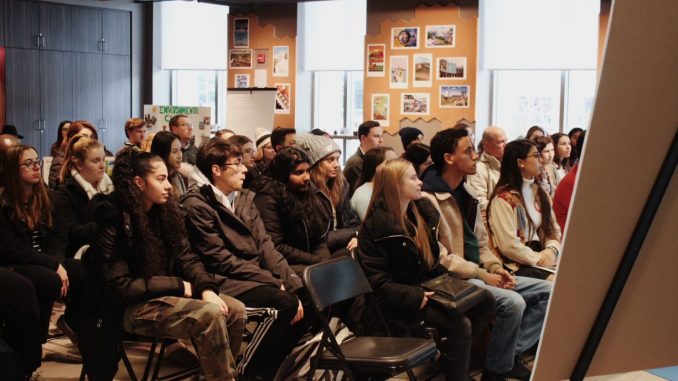
Zarina Sotero, Staff Writer |
The President’s Advisory Council on Sustainability hosted an event in conjunction with the Office of Sustainability called “Owning Your Impact on Climate Change: A Sustainability Showcase.” The event was held at the A.J. Read Science Discovery Center where faculty and students prepared presentations about sustainability and sustainable practices. The presentations were followed by a sustainability fair with tables for carbon footprint calculators, a clothes mending station by the Revival of Apparel Club, Cooperstown Graduate Program Science Museum Studies and other sustainable clubs on campus.
Tracy Allen, Dean of the Sciences, kicked off the event with statements on how sustainability is a core value here at SUNY Oneonta. Allen stated, “We put a lot of effort, and some funds, behind recognizing that sustainability is a value.” For example, there is now a sustainability major on our campus and we now have a Sustainability Coordinator, Rachel Kornhauser. SUNY Oneonta has also refitted facilities on campus to make them sustainable. Most importantly, the college has gotten students involved by integrating sustainability into their curriculum with courses specific to sustainability.
Graduate student Emma Sarnacki gave insight on a positive climate future in the year 2061. Sarnacki was joined by four students who attended a collaborative world building conference in which the students imagined what our world might look like in 2061 if we took “leaps in the right direction towards addressing climate change.” By the year 2061, we would have a nationwide “lights out” event in which cities and college campuses turn off their lights and then turn them back on five minutes later along with a Green New Deal, a New York sea wall, 50% of Americans will identify as vegetarians or vegans and a massive reorganization of the agricultural system to decrease the carbon footprint of food production. These students focused on what this world might look like on the SUNY Oneonta campus. They imagined a campus that supported a new religion that focuses on fixing climate change and abiding by a vegetarian or vegan diet.
Students of Dr. Paul Bischoff’s senior capstone course focused on the effect we have on climate change, and vice versa. Two groups focused their research on sustainable fashion. One group researched the differences between organic and conventional cotton, and which would be the best option for consumers as well as which would be more sustainable. They found that, although conventional cotton is the cheaper option, organic cotton would be more sustainable. Organic cotton shirts can withstand more washes than conventional cotton shirts, the threads of conventional cotton loosened and degraded while the threads of the organic cotton didn’t. The other group researched which types of clothing materials were the most harmful to the environment by looking at the farming, processing, raw materials, land usage et cetera of cotton production. Through extensive research, they found that polyester had the most significant, negative environmental impact. Another group found that if sea levels rise due to climate change, the sea spray will corrode the infrastructures of bridges on coastlines.
Owning your impact on climate change is difficult, especially for college students. Living in a dorm makes it difficult to be sustainable, but there are ways to do it. You can create less garbage, use less electricity and even do something as simple as turning off your water while you brush your teeth.
To find out more on sustainable practices, visit the Office of Sustainability in Milne Library, room 310 or visit their website at suny.oneonta.edu/sustainability.
Leave a Reply